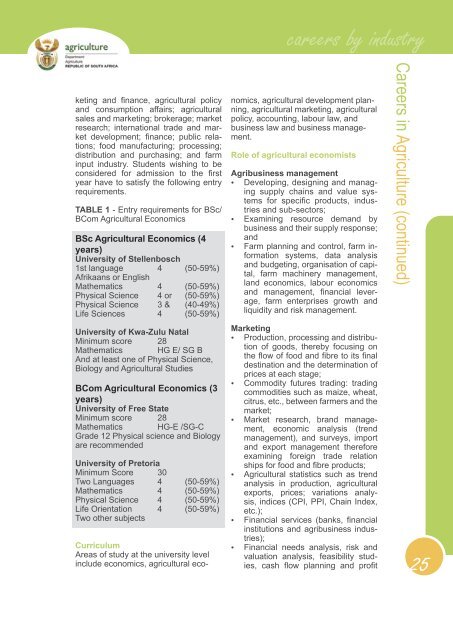CAREER - My SA Career Guide
CAREER - My SA Career Guide
CAREER - My SA Career Guide
Create successful ePaper yourself
Turn your PDF publications into a flip-book with our unique Google optimized e-Paper software.
keting and fi nance, agricultural policy<br />
and consumption affairs; agricultural<br />
sales and marketing; brokerage; market<br />
research; international trade and market<br />
development; fi nance; public relations;<br />
food manufacturing; processing;<br />
distribution and purchasing; and farm<br />
input industry. Students wishing to be<br />
considered for admission to the fi rst<br />
year have to satisfy the following entry<br />
requirements.<br />
TABLE 1 - Entry requirements for BSc/<br />
BCom Agricultural Economics<br />
BSc Agricultural Economics (4<br />
years)<br />
University of Stellenbosch<br />
1st language 4 (50-59%)<br />
Afrikaans or English<br />
Mathematics 4 (50-59%)<br />
Physical Science 4 or (50-59%)<br />
Physical Science 3 & (40-49%)<br />
Life Sciences 4 (50-59%)<br />
University of Kwa-Zulu Natal<br />
Minimum score 28<br />
Mathematics HG E/ SG B<br />
And at least one of Physical Science,<br />
Biology and Agricultural Studies<br />
BCom Agricultural Economics (3<br />
years)<br />
University of Free State<br />
Minimum score 28<br />
Mathematics HG-E /SG-C<br />
Grade 12 Physical science and Biology<br />
are recommended<br />
University of Pretoria<br />
Minimum Score 30<br />
Two Languages 4 (50-59%)<br />
Mathematics 4 (50-59%)<br />
Physical Science 4 (50-59%)<br />
Life Orientation 4 (50-59%)<br />
Two other subjects<br />
Curriculum<br />
Areas of study at the university level<br />
include economics, agricultural eco-<br />
careers by industry<br />
nomics, agricultural development planning,<br />
agricultural marketing, agricultural<br />
policy, accounting, labour law, and<br />
business law and business management.<br />
Role of agricultural economists<br />
Agribusiness management<br />
• Developing, designing and managing<br />
supply chains and value systems<br />
for specifi c products, industries<br />
and sub-sectors;<br />
• Examining resource demand by<br />
business and their supply response;<br />
and<br />
• Farm planning and control, farm information<br />
systems, data analysis<br />
and budgeting, organisation of capital,<br />
farm machinery management,<br />
land economics, labour economics<br />
and management, fi nancial leverage,<br />
farm enterprises growth and<br />
liquidity and risk management.<br />
Marketing<br />
• Production, processing and distribution<br />
of goods, thereby focusing on<br />
the fl ow of food and fi bre to its fi nal<br />
destination and the determination of<br />
prices at each stage;<br />
• Commodity futures trading: trading<br />
commodities such as maize, wheat,<br />
citrus, etc., between farmers and the<br />
market;<br />
• Market research, brand management,<br />
economic analysis (trend<br />
management), and surveys, import<br />
and export management therefore<br />
examining foreign trade relation<br />
ships for food and fi bre products;<br />
• Agricultural statistics such as trend<br />
analysis in production, agricultural<br />
exports, prices; variations analysis,<br />
indices (CPI, PPI, Chain Index,<br />
etc.);<br />
• Financial services (banks, fi nancial<br />
institutions and agribusiness industries);<br />
•<br />
Financial needs analysis, risk and<br />
valuation analysis, feasibility studies,<br />
cash fl ow planning and profi t<br />
<strong>Career</strong>s in Agriculture (continued)<br />
25


